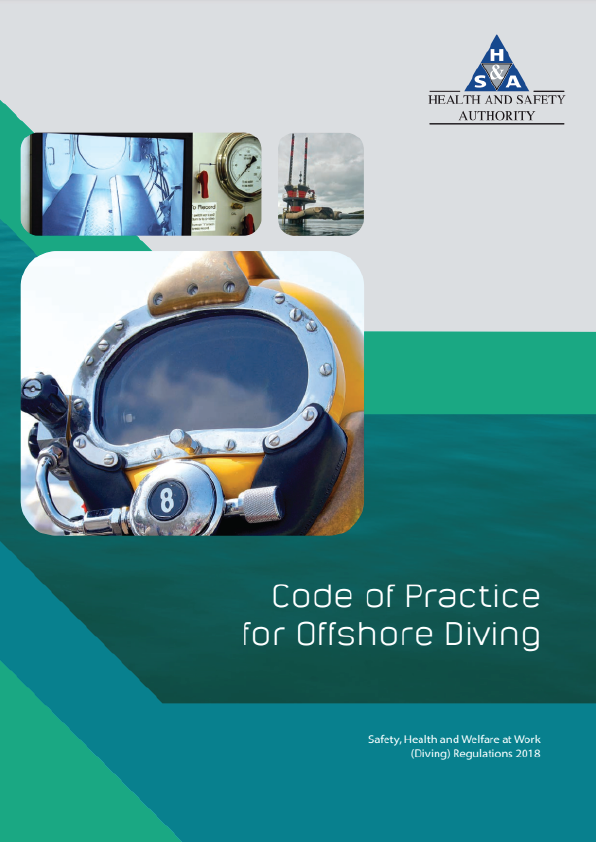Background
1.1 Offshore diving can be a pressurised and dangerous work environment and can present a unique combination of occupational health and safety issues. Serious incidents can occur unless appropriate planning has been carried out and safety measures are in place.
1.2 This code of practice specifically relates to all offshore diving projects as described in paragraph 2.4 of this code of practice.
Status and Scope of this Code of Practice
1.3 This code of practice is published by the Health and Safety Authority under Section 60 of the Safety, Health and Welfare at Work Act 2005 (No. 10 of 2005) – hereafter the ‘2005 Act’ – and with the consent of Pat Breen TD, Minister of State at the Department of Business, Enterprise and Innovation.
1.4 The aim of this code of practice is to provide practical guidance on the safe management of diving at work. It provides assistance on the observance of the requirements of the Safety, Health and Welfare at Work (Diving) Regulations 2018 (S.I. No. 254 of 2018) – hereafter the ‘Diving Regulations’. It is targeted at clients, diving contractors, diving supervisors, divers and other people who may be involved in offshore diving projects (as defined in Section 2 of this code).
1.5 Diving at work is covered by a wide range of legislation. In addition to the Diving Regulations and the 2005 Act, other health and safety legislation may apply, including:
- Safety, Health and Welfare at Work (General Application) Regulations 2007 to 2016 (S.I. No. 299 of 2007 as amended)
- Safety, Health and Welfare (Construction) Regulations 2013 and 2019 (S.I. No. 291 of 2013 as amended)
- Safety, Health and Welfare (Offshore Installations) Act 1987 (No. 18 of 1987) and associated Regulations.
1.6 It should not be assumed that compliance with the Diving Regulations means compliance with all aspects of the law. The requirements of other legislation will also need to be fulfilled, as appropriate. The Diving Regulations need to be read in the general context of the 2005 Act and associated Regulations and any other relevant statutory provisions. It is essential to place the safe management of diving projects in the context of the overall safe management of work as detailed in the Safety Statement, which is required under Section 20 of the 2005 Act.
1.7 In addition, the requirements of the Merchant Shipping Acts and associated Regulations apply to all vessels being used in connection with diving at work. Compliance with this code of practice in no way removes the obligation to comply with the applicable merchant shipping legislation.
Definitions
2.1 The definitions given here are for the Diving Regulations and this code of practice only and selected terms are explained in that context. Other key terms used in this code of practice are defined in Appendix 1. The Safety, Health and Welfare at Work (Diving) Regulations 2018 are made under the Safety, Health and Welfare at Work Act 2005. Definitions in the 2005 Act are in general not redefined in the Diving Regulations.
2.2 Diver means a person who dives in the course of his or her work.
2.3 At work means that there is a contract of employment and divers are working in the context of an employer–employee relationship. It can mean working as an employee or as self-employed person. The phrase covers divers who dive as part of their duties as employees. It also covers divers who are in business for themselves, during the time that they devote themselves to work as a self-employed diver. Diving does not have to be the main work activity of the employee or the selfemployed person.
2.4 Offshore diving projects means all diving projects: (a) at sea outside the State’s territorial seas adjacent to the State (generally twelve nautical miles from the low water line) which are subject to the 2005 Act; this will include, for example, all diving operations in the State’s designated area of the continental shelf undertaken in connection with offshore installations, wells and pipeline works; (b) at sea off, or in connection with, offshore installations, pipelines and cable works within the State’s territorial seas; (c) in connection with alternative energy resources such as structures generating power from wind, waves, tide or currents; (d) where closed bell or saturation diving techniques are used; (e) from vessels maintaining station by use of dynamic positioning; and (f ) involving diving operations at depths greater than 50 metres.
2.5 Competent person means, taking account of Section 2(2) of the 2005 Act, that a person, having regard to the task (diving and/or working while diving) he or she is required to perform, and taking account of the size or hazards (or both of them) of the undertaking in which he or she embarks, possesses sufficient training, qualifications, experience and knowledge appropriate to the nature of the work and diving method to be undertaken.
2.6 Person is as defined in the Interpretation Act 2005.











